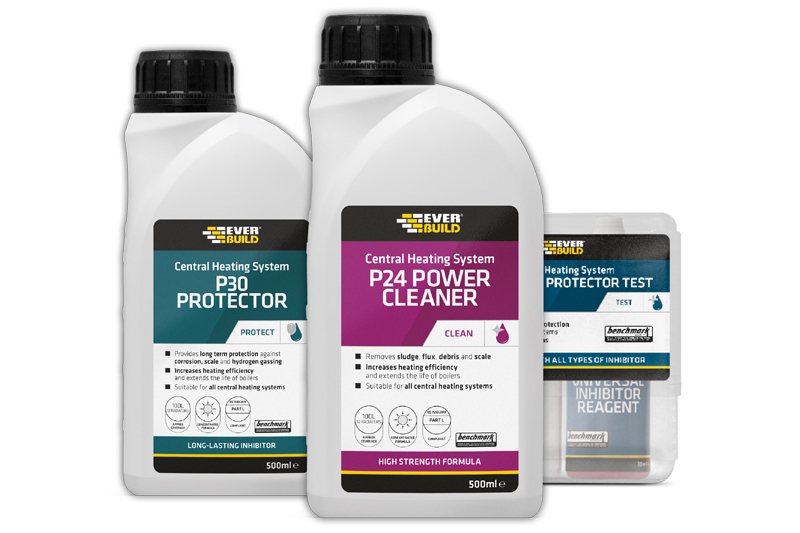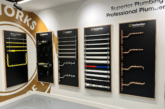
In an article from the pages of PBM’s December edition, Andrew Scanlon, Applications Manager from Sika Everbuild, answers some of the frequently asked questions relating to central heating systems maintenance and efficiency.
Energy usage is a hot topic at the moment. With fuel prices rising and the threat of energy supply issues on the horizon, not to mention environmental concerns, it’s no wonder that professional plumbers and heating engineers are coming under pressure from homeowners wanting to make sure their heating is running as efficiently as possible.
And for the time being at least, wet central heating remains one of the most common heating systems in UK homes. Central heating inhibitors and cleaners play a vital role in maintaining and protecting these water-based heating systems, improving efficiency and keeping costly repairs at bay. With so many different products available, it is important that merchants can address any queries at the trade counter so they can point their customers in the right direction this winter…
Q: If there is a loss of water pressure in the system due to a leak, will leak sealer products only provide a temporary solution which requires further maintenance in the future?
A: Even a very small leak can result in a significant loss of pressure, making the whole central heating system run less efficiently, burning through more energy and therefore costing more. It’s not always possible to see where a leak is, let alone reaching the spot to fix it.
This is where leak sealer products, which can either be in liquid or aerosol form, offer an excellent solution and many do provide a robust long-term fix. Everbuild’s P32 Leak Sealer, for example, is designed to seal small inaccessible leaks permanently. It works by quickly locating the areas of water loss before forming a soft barrier to block up small capillary holes without restricting flow throughout the rest of the system.
Q: How can the pH value of the water in the system be rectified if it’s not at the right level?
A: The pH value of water flowing within a central heating system should always sit between 8.0 and 8.5 on the scale, which is slightly above neutral to ensure that the metals in the system do not corrode over time and cause blockages. Chemical inhibitors such as P30 Protector from Everbuild will protect systems against internal corrosion by using enhanced pH buffering to ensure the optimum pH level is maintained constantly which prevents limescale build-up.
Q: Are biocide products really needed or are they just a clever marketing ploy?
A: A biocide can be a really important part of ensuring central heating systems remain clean and clear so that they run at peak efficiency. Powerful cleaning products will remove larger deposits causing blockages in a system — including limescale, sludge and rust — but typically won’t remove the microscopic fungus or bacteria which can create blockages or corrode parts of the system if left untreated.
For example, the P26 Biocide from Everbuild has been formulated to kill fungus and bacteria rapidly and, once treated, remains in the system preventing any new formation of bacteria and fungus. A biocide will protect the whole system — pipes, boiler, radiators and underfloor heating — providing a reliable solution to the problem of bacteria and fungus or mould growth.
Q: What special treatment (if any) does an older central heating system require?
A: Older systems are more likely to have a variety of build-ups including limescale, rust deposits and sludge which may have accumulated over time, and are often worse if a system has been left switched off for long periods too.
For such cases, we’d recommend the full clean, protect and test treatment and opting for a high-performance cleaner such as Everbuild’s P24 Power Cleaner which will effectively clear all the build-ups and blockages within the system. It’s also ideal for use when a new boiler has been installed, whatever age or condition of the rest of the system. Commissioning residue such as flux, oil and rust can get left behind in the system so it’s worth doing an intensive clean to flush the system clear and protect the new boiler from the outset.
Q: How long will different types of inhibitors provide protection from further build-ups within a wet central heating system, on average?
A: Having the optimum amount of inhibitor in the system is key to achieving the best results. But how long it will last very much depends on the system itself as well as the type of inhibitor used. Electrolytic or magnetic scale inhibitors typically are able to provide up to 10 years protection from limescale for the whole system with little maintenance required.
Generally speaking, with a chemical inhibitor it’s advisable to check levels annually using a simple test like Everbuild’s Universal Test Kit which shows whether any additional inhibitor needs to be added. This is a really quick way of making sure systems are fully protected before the tell-tale signs of a blockage or build-up start to be seen.
Some systems will require annual top-ups while others can go several years without this need, but testing regularly is a way to prevent problems at the earliest opportunity so your customers can save time, energy and money.









